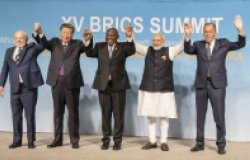
A blog of the Kennan Institute
Peacemakers’ Olympics

Regional powers whose leaders have been building foreign policy in a pragmatic, multivector fashion are increasingly vying for a role in ending Russia’s war against Ukraine. These missions, some of them more self-serving than others, compete with Volodymyr Zelensky’s peace plan, which Ukraine keeps trying to defend in its interactions with foreign powers.
In recent months, a willingness to mediate between the warring nations has been expressed by Hungary’s prime minister Viktor Orbán, India’s prime minister Narendra Modi, Bulgarian prime minister Dimitar Glavchev, Turkish foreign minister Hakan Fidan, and China’s and Brazil’s top foreign policy officials. Saudi Arabia, which has a decent working relationship with Russia, maybe interested too, some experts have suggested.
The Ukraine-organized summit held in June in Switzerland was intended to make sure as many countries as possible stood behind the Ukrainian peace formula, or at least the most crucial parts of it. The joint communiqué ended up containing just the kinds of issues the Swiss side deemed least divisive. Those were the safety of Ukraine’s nuclear installations, a call not to use nuclear weapons, global food security, a full prisoner exchange, and the return of the deported children. A debate over Russia’s reparations to Ukraine or Moscow’s responsibility for war crimes would narrow the list of the signatories.
Even this “safe” version was signed by 83 country representatives out of more than 100 participants. Brazil, India, Indonesia, South Africa, Saudi Arabia, and India did not sign the communiqué, and China did not participate in the meeting altogether. Politicians from the global south are not inclined to support Ukraine’s—and the West’s—approach to peace that involves punishing Russia.
Those who did not sign are among the new prospective peacemakers. Interestingly, Hungary and Turkey who are making a point of talking to both sides in the war, did sign the communiqué.
Where Potential Peacemakers Stand
Viktor Orbán’s push for negotiations aligns with his broader strategy to shift the European focus from military support for Ukraine to peace negotiations, experts from the Institute for the Study of War suggest. As Hungary assumed the EU Council presidency on July 1, Orbán has consistently opposed the EU’s military assistance to Ukraine, emphasizing instead the need for a diplomatic resolution. This Russia-supported stance aims to dilute the EU’s unified support for Ukraine.
Orbán is also building a foreign policy toward China that is independent of the EU’s policy of reducing dependence on China as a major exporter to Europe.Orbán and his government officials insist that Hungary should attract more Chinese investment to reduce dependence on Western capital markets, notes Re:Russia, a Russian expert platform.
Turkey, another player that is eager to maintain relations with both the West and Russia, has also been suggesting itself as a mediator. Turkish foreign minister Hakan Fidan proposed establishing a peace platform to prevent deepening polarization and prioritize diplomacy. Turkey has done some successful mediating before. It was instrumental in reopening the Black Sea to grain shipments from Ukraine.
Saudi Arabia is seen as one of the potential hosts of the next peace summit that would follow up on the work done at the June summit. That potential summit, most participants agreed, would include Russia’s representatives. The Saudi strategy focuses on maintaining strategic autonomy and engaging with all major global players to enhance its diplomatic influence.
The United Arab Emirates may also join an alternative peacemaking mission. The UAE has already facilitated behind-the-scenes negotiations on a prisoner exchange between Ukraine and Russia.
Brazil and China have also joined forces to advocate for peace talks, emphasizing the need for negotiation as the only viable solution to the conflict. Their joint statement calls for Russia and Ukraine to adhere to three principles: no expansion of the battlefield, no escalation of fighting, and no provocation. Both nations stress the importance of preventing the use of weapons of mass destruction and promoting nuclear nonproliferation.
A Clash of Value Statements Hinders Ending the Conflict
At peace summits and in broader communications with the world, Ukraine speaks the language of values. It rightly condemns unprovoked aggression by authoritarian Russia against a country seeking self-determination based on a conscious democratic choice. Western politicians and intellectuals have also used the language of values, arguing that by supporting Ukraine, they are supporting the right to democratic self-determination in the face of authoritarian aggression.
The Kremlin is insisting on a “morality” of its own. It claims to be waging a “liberation struggle” against Ukrainian “Nazism” and the imposed U.S.-dominated world order that disqualifies Russia.
Nothing is wrong with moral statements as such, particularly when they are honest. But moral stance may be a problem at negotiations. In his bookAmerican Diplomacy, George Kennan argued that American politicians’ tendency to frame every conflict in moral terms was not helpful in building a pragmatic foreign policy.
Stephen Walt, professor of international affairs at Harvard, who reminds his readers about Kennan’s view, writes that moral or value-based language can be useful for rallying citizens and winning support. “But it makes it harder for U.S. officials to bargain effectively with potential adversaries, either because we refuse to have diplomatic relations with them, or because even a mutually beneficial deal with a supposedly ‘evil’ regime is seen as a cowardly failure to uphold key moral principles,” Walt writes.
But Bargaining Might Succeed
When the United States is not seen as an effective mediator, other powers are eager to try their hand. Politicians who are not inclined to value-based approaches to settlements and who do not demonstrate a willingness to take sides and join the West or Russia eventually enter the peacebuilding arena.
“A majority of countries tend to adopt positions of multi-alignment, of double-dealing between Western countries and the emerging or re-emerging powers of the South in the broad sense of the term, including Russia,” says Jean-Joseph Boillot, associate research fellow at IRIS.
It seems increasingly likely that the fate of the war will be determined with the participation of players inclined to see it not as a conflict of values but as a conflict of interests that can be resolved through bargaining, experts from Re:Russia conclude.
The opinions expressed in this article are those solely of the author and do not reflect the views of the Kennan Institute.
See our newest content first.
Subscribe to receive the latest analysis from the Russia File
About the Author

Maxim Trudolyubov
Editor-at-Large, Meduza
Maxim Trudolyubov is a Senior Fellow at the Kennan Institute and the Editor-at-Large of Meduza. Mr. Trudolyubov was the editorial page editor of Vedomosti between 2003 and 2015. He has been a contributing opinion writer for The International New York Times since the fall of 2013. Mr. Trudolyubov writes The Russia File blog for the Kennan Institute and oversees special publications.
Read More
Kennan Institute
The Kennan Institute is the premier US center for advanced research on Eurasia and the oldest and largest regional program at the Woodrow Wilson International Center for Scholars. The Kennan Institute is committed to improving American understanding of Russia, Ukraine, Central Asia, the South Caucasus, and the surrounding region though research and exchange. Read more













